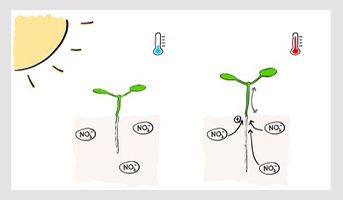Seminar Dr Anne-Sophie Fiorucci
Deciphering the interplay between growth responses to temperature and nitrate nutrition - Thursday, June 5th 2025 11 am, INRAE, Versailles
Nitrogen is one of the most important nutrients for plant growth and development. In temperate aerobic soils, nitrate ions (NO3-) are the main source of nitrogen for many plant species and roots are exposed to large variations of nitrate availability. To ensure high crop yields, nitrate-based fertilizers are supplied in large excess in agricultural soils. However, such excess is transient due to depletion by roots and leakage, which has potentially harmful consequences for the environment. It is crucial to understand how plants deal with nitrate supply and how it affects their development, especially in constraining environments. A good example of such challenging situations is the elevation of ambient temperature like those associated with the current climate change. In some species like Arabidopsis thaliana, it triggers a developmental response called thermomorphogenesis, which leads to elongation of vegetative organs like hypocotyls, roots or stems. Hypocotyl growth in this context corresponds to a regulation of cell elongation. To date, it has been mainly associated with hormonal regulation, but elongating cells also need primary metabolites. Our objective is to understand how plants integrate nitrate nutrition and growth responses to temperature in the model plant Arabidopsis thaliana, by using physiological approaches as well as genetics and transcriptomics.
Anne-Sophie Fiorucci, équipe "Integrated approaches to ion transport", I2BC, Gif-sur-Yvette
Invitation : Nicolas Arnaud, "Transcription Factors and Architecture" FTA team
In connection with the research developed at the Institute Jean-Pierre Bourgin for Plant Sciences.
Anne-Sophie Fiorucci, équipe "Integrated approaches to ion transport", I2BC, Gif-sur-Yvette
Invitation : Nicolas Arnaud, "Transcription Factors and Architecture" FTA team
In connection with the research developed at the Institute Jean-Pierre Bourgin for Plant Sciences.
Back
